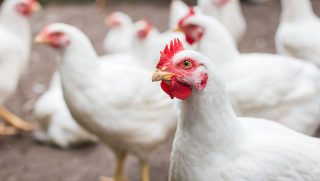Leaders of various ag associations spoke today before a House Agriculture Subcommittee to address conservation policy in the next Farm Bill.
The speakers were Chuck Coffey, on behalf of the National Cattlemen’s Beef Association; Timothy Gertson, USA Rice Federation Board of Directors; Jeremy Peters, National Association of Conservation Districts; David Nomsen, Vice President of Governmental Affairs for Pheasants Forever; John Piotti, President of American Farmland Trust.
Piotti was the final speaker, and his points were threefold:
- Maintaining Funding for the Farm Bill Conservation Title: AFT views the conservation title programs as an essential set of tools to address the complex needs of America’s farmers and ranchers. Each program has demonstrated value to producers and landowners to achieve specific outcomes tailored to their needs. The 2014 Farm Bill marked the first time a Farm Bill voluntarily reduced spending, and it was the only reauthorization bill in that Congress to voluntarily offer savings.
- Protecting Funding for and Streamlining the Agricultural Conservation Easement Program: Farmland is a necessary part of our country’s infrastructure. Protecting farmland from development protects the foundation of our agriculture and agriculture-related industries, which contribute $985 billion to the U.S. gross domestic product. Simply put, federal investments in farmland protection through ACEP provide vital benefits for Americans today and into the future.
- Strengthening the Regional Conservation Partnership Program: RCPP is an innovative program that brings together a diverse array of partners with technical and scientific expertise and leverages private sector dollars. RCPP projects can focus on specific natural resource concerns in specific geographies to magnify desired conservation outcomes. AFT believes that improvements to RCCP in the Farm Bill could help the USDA and its conservation partners quantify the different outcomes associated with conservation practices, which will provide needed evidence to the public, Congress, farmers, and the conservation community to show that voluntary conservation works.
Piotti said, “In the United States, we lose the equivalent of 40 acres of farmland to development every hour. Replacing our farms with homes or shopping centers has ripple effects for our society.”
Among other highlights:
- Coffey said that the USDA’s Natural Resources Conservation Service needs to streamline applications so that more people can participate in the conservation programs.
- Gertson focused on the importance of investments in working-land programs.
- Peters pushed for proper investment in the Farm Bill to help secure the conservation efforts — something the previous Farm Bill failed at, he said. Congress must also continue to promote the idea of locally led conservation efforts.
- Nomsen spoke about the disappearance of ground nesting birds and how critical it is to maintain those habitats.


